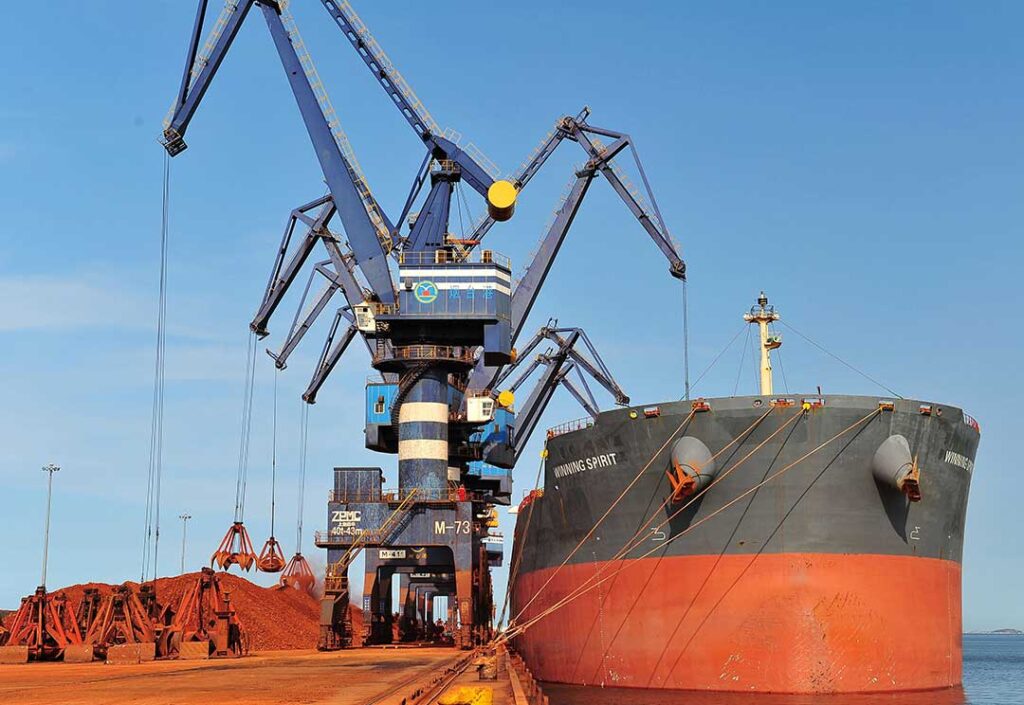ADF STAFF
The military junta ruling Guinea has given Chinese and other international mining companies until the end of May to produce plans for higher pay and improved conditions or face penalties. The request calls for expanding refining capacity, improving working and environmental conditions, and increasing the royalties mining companies pay as part of extracting bauxite and iron ore.
“Despite the mining boom in the bauxite sector, we have to admit that the expected revenues are below expectations,” junta leader Col. Mamady Doumbouya told industry stakeholders during a recent gathering in the capital, Conakry, broadcast on state television.
“The respect of basic agreements remains a nonnegotiable for us,” Doumbouya said. “You and we cannot continue this game of fools that perpetuates great inequality in our relations.”
Doumbouya promised penalties for mining companies that miss the deadline he set for submitting plans.
Guinea is not alone in reexamining its agreement with Chinese mining companies. In the Democratic Republic of the Congo, where Chinese companies have staked claims to the country’s cobalt reserves, President Felix Tshisekedi appointed a commission to investigate claims that one of those mining companies, China Molybdenum, was cheating the government out of billions of dollars in royalty payments. In March 2022, a court appointed a temporary administrator to run the company’s Tenke Fungurume mine while the issue remains under review.
“Years before the outbreak of COVID-19, West African countries were already on the verge of renegotiating their mining policies with foreign investors, leaving behind a business-friendly approach for a more nationalist framework,” Anthony Assassa, a tax expert with accounting firm BDO, wrote in Bloomberg Tax in 2021. At the time, he was BDO’s director of operations for Francophone West Africa, based in Cote d’Ivoire.
Guinea is Africa’s largest producer of bauxite, the ore that is the source of aluminum. It is estimated to have the world’s largest reserves of the mineral (7.4 billion metric tons). Guinea’s bauxite exports grew nearly fivefold from 17.7 million metric tons in 2015 to more than 82.4 million metric tons in 2020, according to the most recent information available from the U.S. Department of Commerce.
In 2020, Guinea exported 82.4 million metric tons of bauxite worth $3.3 billion. Of that, 64% — 52.7 million metric tons — went to China. Guinean bauxite made up half of China bauxite imports that year. More than a dozen Chinese mining companies currently operate in the country.
Guinea also is home to the 2-billion-metric-ton Simandou iron ore deposit that has so far gone unexploited. The junta negotiated a $15 billion, 35-year deal to open the site in March, but the future of the project is stymied by the lack of means to transport the ore 400 miles to the coast for shipping.
Mining companies currently receive about $50 per metric ton for the bauxite they mine in Guinea. But only a small portion of that makes it back to the Guineans who mine the ore and live amid the red dust the work generates.
Guinea receives royalties of 0.075% for bauxite ore and up to 5% for iron ore. Despite its enormous mineral wealth, Guinea ranks near the bottom of countries globally in terms of health, education and living conditions.
According to Human Rights Watch, mining companies exploit ambiguities in Guinean law to claim ancestral farmlands with little or no compensation.
Guinea has just one decades-old aluminum smelter in operation. While companies operating in Guinea have proposed building refineries capable of processing up to 11 million metric tons per year, they have made little progress. According to Guinean Minister of Mines Moussa Magassouba, China’s TBEA Guinea mining operator promised to build an aluminum smelter as part of its mining concession but has done nothing so far. The same is true for four other Chinese-owned mining companies.
That must change, Doumbouya said in his meeting with stakeholders. In addition to setting a May deadline for refinery plans, he demanded that all raw materials used in manufacturing be produced in Guinea as well.
The on-site processing of the ore “is becoming essential, it is imperative and without delay,” Doumbouya said.
Doumbouya’s demand is the first time the Guinea junta has shown its determination to pursue its policy of resource nationalism, according to Anthony Everiss, a senior aluminum analyst at the CRU Group.
“Guinea is now much more aware of the value of their resources,” Everiss told the South China Morning Post.

